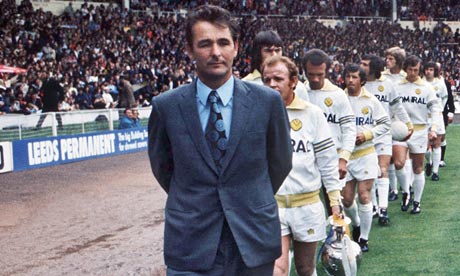
This month John Mullan is discussing The Damned Utd in the Guardian book club and I have to admit to a certain amount of nervousness. The fear is that these words will provide little more than a short staging post to vicious attacks.
I imagine there are many people who have been sharpening their knives for David Peace – the British media's current literary darling – for a while now. Ever since they were told, say, that Red Riding was "a grimly powerful piece of television as has ever been made" with "magnificent" writing – but they watched something dull, borderline incomprehensible, and cliché-ridden. Or since reading that he is one of our best young novelists one time too often.
None of this is Peace's fault. He is the victim of hype, not the cause. But it's hard not to be cynical when critics have abused so many adjectives in his name. The Damned Utd is a case in point: "darkly glittering"; "expansive and ambitious"; "a place where everyday life intersects terrifyingly with the mystical and the diabolic". Noting that the book's subject, Brian Clough, has a good line in hubris, the Guardian's own Alfred Hickling even suggests that "if Euripides had ever tried ghosting football memoirs he could not have done it better".
But those after retribution for such journalistic offences will have to look below the line. Here you're going to get more of the same. Indeed, while Hickling's hyperbole is undoubtedly off-putting (and didn't he mean Sophocles?), he's right about the hubris. David Peace's Brian Clough – Old Big 'Ead – is a proud man building up to a mighty fall.
We follow him in two distinct sections:
One follows Clough from the injury that forced him to stop playing and start managing, up to the point he takes over Leeds – after dragging Derby County up from the bottom of Division Two to the top of Division One, by sheer force of personality. The other is a day-by-day account starting when Clough takes over the English football league champions Leeds Utd in 1974. As well as winners, the team are thugs; notorious for tackling too hard, intimidating referees and boring out low scoring victories. When he meets them, Clough says: "As far as I am concerned, the first thing you can do for me is to chuck all your medals and all your caps and all your pots and all your pans into the biggest fucking dustbin you can find, because you've never won any of them fairly." Unsurprisingly, the players revolt, Leeds head down to the bottom of the table and just 44 days later Clough is sacked.
Peace makes the question of whether "the boss" intended to destroy or to change Leeds United more interesting by not answering it. Clough's motives are opaque. But that's not to say that we don't get inside his head. Peace gets us so close to him that it feels uncomfortable. The narrative voice seems to tap his very thought stream; a great rush of words, repetitions, accusations, doubts and deliberations pouring straight from his soul.
So successful is this voice, and so immediately compelling, that it took me a while to appreciate how strange it is too. Peace does something very audacious here. He writes the entire book in an urgently immediate present tense, and the section of the book dealing with events before Clough moved to Leeds is all presented in an italicised second person::
"You follow Pete home; knock on his door; let yourself in. You pour him a drink; pour yourself one; light you both a fag and put your arms around him."
It's the kind of thing that creative writing courses will tell you never to attempt, but it works. It gives this part of the book an accusatory, finger-jabbing tone and a sense of permanently bubbling rage that is entirely fitted to Clough's state of mind.
Other quirks, like the constant repetitions, are less successful. They certainly create an incantatory feel that partly explains why Peace called this book an "occult history of Leeds United", but they can also grow dull and slip over into parody: "I tilt the chair back on two legs. I tilt the chair back on two legs and I close my eyes. I close my eyes and I tilt the chair back."
I also grew bored of the football matches, the player lists and the goals I couldn't see. But, really, these are quibbles. The important thing is that I never grew tired of Peace's Brian Clough. He's probably even more interesting than the real one.
But do you believe the hype? All comments will be even more gratefully received than usual, since they'll help inform John Mullan's final column on the book, on readers' responses to it …

